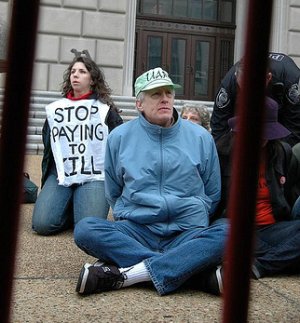I’m sure all the fellows down at the 19th Hole will be jealous when they hear that I’m in this month’s Money magazine.
The article isn’t on-line, but it’s fairly prominently-featured in the issue (the cover teaser-headline — “How To Pay Zero Taxes” — appears directly above the “oney” in Money).
The article covers ways the rich, the poor, the expatriate, and the small business owner can and cannot get out of paying U.S. federal income tax. The tone of the article can be quickly deduced from its subtitle: “How To Pay Zero Taxes: Nearly 50 million Americans do it. But once you see how, you’ll be glad you’re not one of them.” Oh well.
For the target audience for Money, a “voluntary simplicity” lifestyle is either an exotic fairytale or it means deciding on a smaller vacation home or shopping for Shaker furniture. The opening paragraph addresses this audience of poor little rich readers thusly: “…No matter how many times you go over the figures, you get the same answer. That number on your screen — what you’re paying the IRS this year — is more than your dad earned in his five best years.…”
That said, here’s where I come in to it:
Few among us would want to settle for a drastically lower income just to avoid taxes. But David Gross did just that. After the invasion of Iraq, the 39-year-old technical writer decided that he didn’t want his tax dollars funding the war. Only by earning less, he realized, could he stay within the law.
At the time his salary came to about $100,000 a year. He asked his employer to pay him far less — some $70,000 less — but was turned down. So he quit and launched a business from his apartment, strictly limiting his earnings. In his income was $29,000. He put $2,850 in a health savings account, $4,500 in a simplified employee pension (SEP), and $4,000 in an IRA. Since he works freelance, he can deduct half of his self-employment tax ($1,850) and his health insurance premium ($1,200), leaving him with an adjusted gross income (AGI) of $14,600. After taking the standard deduction and one exemption, his taxable income neared $6,000 and his tax was $493. Low-income earners like Gross are also entitled to a credit for retirement plan contributions. His came to $500 and — poof! — no tax bill.
Because he’s saving so much, Gross has to pinch every penny. But even though he lives in San Francisco, one of the nation’s most expensive cities, he says, “it turned out to be a lot easier than I thought.” Most places he goes are within walking distance, working at home gives him time to cook, and he and his girlfriend (who does pay taxes) rely on Netflix-rented movies for entertainment. Gross believes in the government’s right to levy taxes — he still pays California taxes — but he’s satisfied, he says, that he hasn’t been financing what he calls “the hugely bloated military.”
Can You Do This?
You probably don’t want to emulate Gross’ ascetic lifestyle. Face it: Earning less is a great plan — unless you like to eat dinner out, go to the movies once in a while and own a car. But don’t ignore his example of grabbing every retirement tax break you can find. You can reduce your income and enhance your financial security by funding a 401(k), an IRA, a SEP, or a health savings account.
The article has a few inaccuracies that make me cringe — I have an “ascetic lifestyle”? I believe “in the government’s right to levy taxes”?! — but it could have been a lot worse, and may serve as a foot-in-the-door to a demographic rarely reached by tax resisters.

